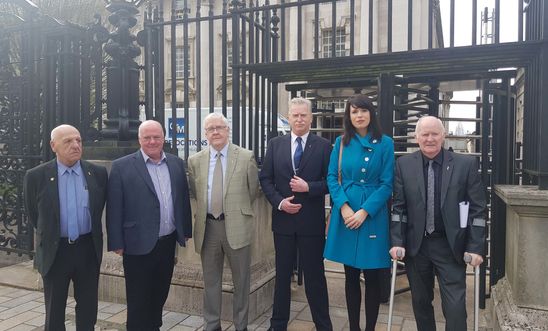
Press releases
Amnesty welcomes decision of Irish Government to seek review of hooded men torture case

Amnesty International has welcomed the decision of the Irish Government to request the Hooded men case be referred to the Grand Chamber of the European Court of Human Rights. In March, Amnesty expressed regrets about the fact that a Chamber of the Court decided not to reconsider its 1978 ruling where it concluded that the treatment to which the United Kingdom subjected the 14 ‘hooded men’ in Northern Ireland did not amount to torture.
The Court invoked a procedural rule which it considered prevented it from revising the merits of its 1978 decision on the basis of newly-revealed facts, including clear evidence of the severe long-term effects that the five techniques had on its victims. Interrogation techniques causing such suffering can only be legally described in one word - torture.
Grainne Teggart, Amnesty’s Northern Ireland campaigns manager, said:
“This is a very welcome move by the Irish Government. In March the court missed a vital opportunity to put right a historic wrong. To our disappointment, it relied largely on procedural arguments to avoid substantively revisiting its 1978 ruling. It’s wrong that States which resorted to torture have been able to find comfort in the flawed 1978 ruling. Torture can never be justified.
“When Amnesty visited the detainees in 1971, we found clear evidence of torture. Our assessment has not changed in the years since.”
Colm O’Gorman, Executive Director of Amnesty Ireland, said:
“In 1971, Ireland took a brave, unprecedented step when bringing the case against the UK. We commend the Irish Government for continuing their efforts to try to help these men, and the families of the men who have since died, to have their rights to truth and justice vindicated.
“In taking this case, then in seeking a revision and now appealing to the Grand Chamber, Ireland has maintained this treatment was torture. So did the men, their lawyers, and Amnesty International. This is what we have asserted ever since, and assert again today. We will continue to stand strong in defence of the universal and unconditional prohibition of torture and other ill-treatment.”
1978 ruling: In its 1978 landmark Ireland v UK judgement, in a case taken against the UK by the Irish Government, the Court had found that the UK violated the men’s rights to be free from inhuman and degrading treatment, but that the treatment the men suffered did not amount to torture. The detained men were interned in 1971, and subjected to sustained interrogation by the British Army and Royal Ulster Constabulary, involving the ‘five techniques’ of hooding, stress positions, white noise, sleep deprivation, and deprivation of food and water. These were combined with physical assaults and death threats, which the Court did not consider in its 1978 ruling.
2014 court case: In 2014, the Irish Government requested the Court revise that judgement to a finding of torture based on new information revealed in an RTÉ documentary called The Torture Files. The documentary showed that, contrary to what the UK Government had told the Court, it had evidence of the physical and psychological suffering these ‘techniques’ inflicted, and that they had been sanctioned by the highest levels of Government.